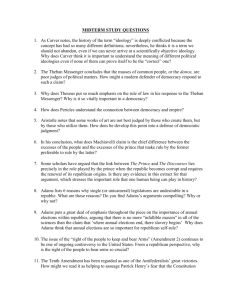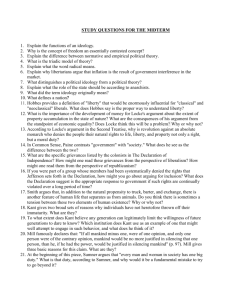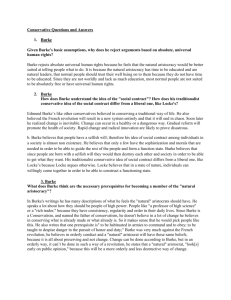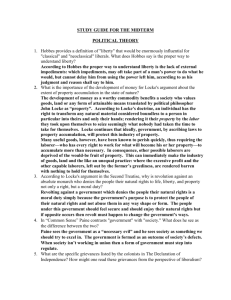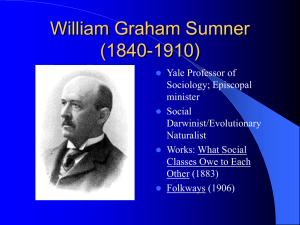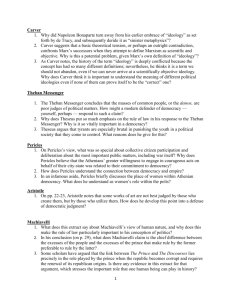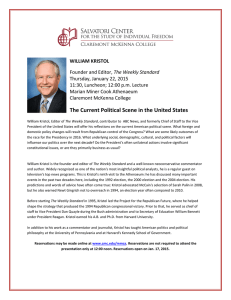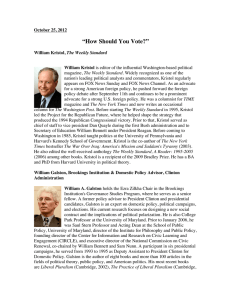study guide for the midterm
advertisement
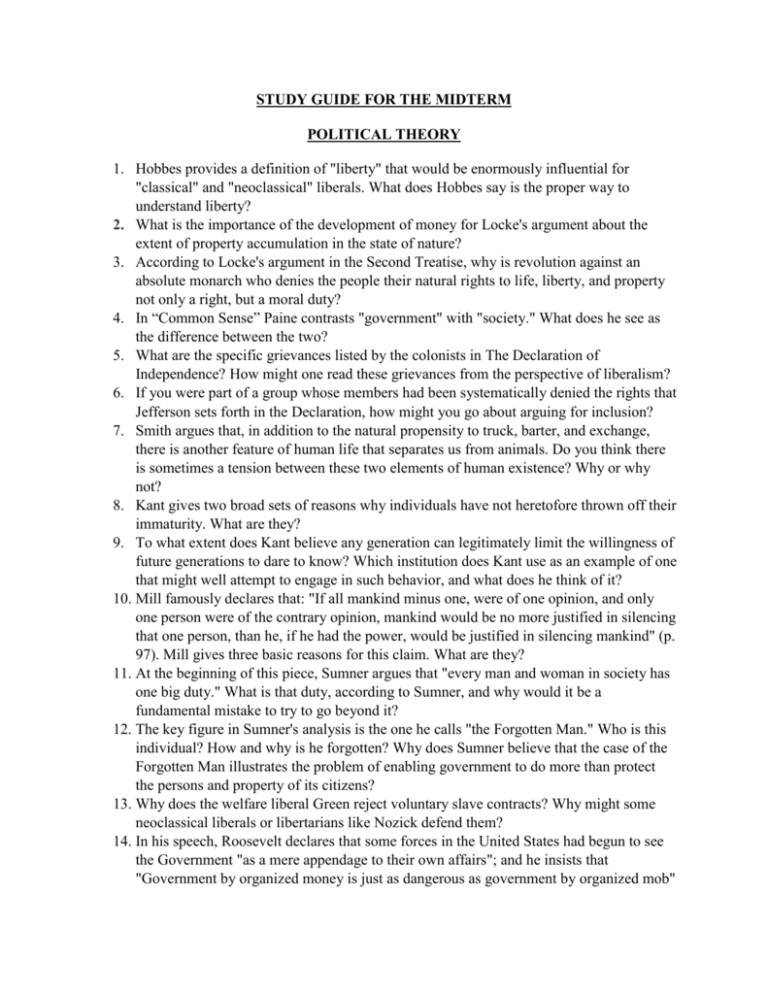
STUDY GUIDE FOR THE MIDTERM POLITICAL THEORY 1. Hobbes provides a definition of "liberty" that would be enormously influential for "classical" and "neoclassical" liberals. What does Hobbes say is the proper way to understand liberty? 2. What is the importance of the development of money for Locke's argument about the extent of property accumulation in the state of nature? 3. According to Locke's argument in the Second Treatise, why is revolution against an absolute monarch who denies the people their natural rights to life, liberty, and property not only a right, but a moral duty? 4. In “Common Sense” Paine contrasts "government" with "society." What does he see as the difference between the two? 5. What are the specific grievances listed by the colonists in The Declaration of Independence? How might one read these grievances from the perspective of liberalism? 6. If you were part of a group whose members had been systematically denied the rights that Jefferson sets forth in the Declaration, how might you go about arguing for inclusion? 7. Smith argues that, in addition to the natural propensity to truck, barter, and exchange, there is another feature of human life that separates us from animals. Do you think there is sometimes a tension between these two elements of human existence? Why or why not? 8. Kant gives two broad sets of reasons why individuals have not heretofore thrown off their immaturity. What are they? 9. To what extent does Kant believe any generation can legitimately limit the willingness of future generations to dare to know? Which institution does Kant use as an example of one that might well attempt to engage in such behavior, and what does he think of it? 10. Mill famously declares that: "If all mankind minus one, were of one opinion, and only one person were of the contrary opinion, mankind would be no more justified in silencing that one person, than he, if he had the power, would be justified in silencing mankind" (p. 97). Mill gives three basic reasons for this claim. What are they? 11. At the beginning of this piece, Sumner argues that "every man and woman in society has one big duty." What is that duty, according to Sumner, and why would it be a fundamental mistake to try to go beyond it? 12. The key figure in Sumner's analysis is the one he calls "the Forgotten Man." Who is this individual? How and why is he forgotten? Why does Sumner believe that the case of the Forgotten Man illustrates the problem of enabling government to do more than protect the persons and property of its citizens? 13. Why does the welfare liberal Green reject voluntary slave contracts? Why might some neoclassical liberals or libertarians like Nozick defend them? 14. In his speech, Roosevelt declares that some forces in the United States had begun to see the Government "as a mere appendage to their own affairs"; and he insists that "Government by organized money is just as dangerous as government by organized mob" (p. 111). Which institutions, forces, and individuals does Roosevelt single out as examples of this tendency? What does he claim is their philosophy of government? 15. What sorts of programs does Roosevelt single out as essential ones for the continuation of the New Deal in his second term? How are these programs illustrative of the welfare liberal conception of "positive freedom"? 16. Like Mill's invocation of the "harm principle," Allen's argument rests on a distinction between what philosophers call "self-regarding" and "other-regarding" actions. However, as a number of critics have pointed out, the line distinguishing these types of actions can sometimes seem very fuzzy. For example, is recreational drug use in the privacy of one's own home (which most libertarians, including Allen, wholeheartedly support), a purely self-regarding action? It might seem that the easy answer is, "yes." However, what if the drug user becomes addicted and the cost of his or her treatment falls to other taxpayers? How might a libertarian, especially one sympathetic to the logic of Social Darwinism, respond to this criticism in a logically consistent fashion? 17. Despite the fact that libertarians take some positions generally associated with the political left wing, and some positions associated with the political right wing, Rothbard does not believe that they are confused. Indeed, he argues that libertarianism is the only truly consistent variant of liberalism as an ideology. Why? 18. In the first section of the essay, Ball describes the ways in which a number of goods and services that are now provided by state would be privatized in Marketopia. What examples does he offer? 19. Why does Ball think "Marketopia" is unfair? 20. Given Burke's basic assumptions, why does he reject arguments based on absolute, universal human rights? 21. How does Burke understand the idea of the "social contract"? How does his traditionalist conservative idea of the social contract differ from a liberal one, like Locke's? 22. What does Burke think are the necessary prerequisites for becoming a member of the "natural aristocracy"? 23. De Maistre rejects the constitution of 1795, drawn up by the French Revolutionaries, as a ridiculous and absurd document. What reason(s) does he give for this? 24. Who does de Maistre think are the true founders of nations, and how is this related to his concepts of a constitution (rightly understood) and the "national soul"? 25. What is Oakeshott's conception of "human nature"? What are its characteristics? Why does he think that "friendship" is conservative? 26. Oakeshott argues that "moderation" is essential to conservative politics. What does he mean by this, and why does he think that it is important? 27. Why does Kirk believe that conservatism is not an ideology? 28. At the beginning of the essay, Bork relies on the work of thinkers who have developed the concepts of "defining deviancy up" and "defining deviancy down." What do these concepts mean, and why does Bork think they are so important? 29. Why does Bork think that a commitment to "radical egalitarianism"---or much greater equality in society---will culminate in "tyranny"? Indeed, what does he mean by tyranny? 30. What does Bork mean when he calls "hedonism" the true danger of radical individualism? How does he think modern technology makes this danger worse? 31. What reasons does Kristol give for why neoconservatives are so keen to cut taxes, and so unafraid of large budgetary deficits? 32. What examples does Kristol give to illustrate "the decline of our democratic culture"? 33. Kristol presents the reader with a number of "theses" that underpin the neoconservative approach to foreign policy. What are they? 34. Antle notes that Frank Meyer made the case for conservative "fusionism." What did Meyer see as the principles uniting neo-liberal libertarians and traditionalist conservatives, beyond economics, according to Antle? 35. At the end of the essay, Antle notes that all hope might not be lost for "fusionism," and that the "conservative crack-up" might be avoided. What does he think prevented an earlier crack-up? 36. Explain what Marx argued regarding the proletariat. 37. Explain the basic ideas of Thomas More. 38. Robert Owen defends which type of socialism. Why? 39. Describe the distinguishing features of Stalin’s version of Marxism-Leninism. 40. Explain the difference between Marx and Hegel. 41. Explain Marx’s revolutionary sequence. 42. Explain what Marx means by the “dialectic of change”. 43. Describe Marx’s critique of capitalism. 44. What is Marx’s conception of history? 45. What did the Utopian Socialists argue?
